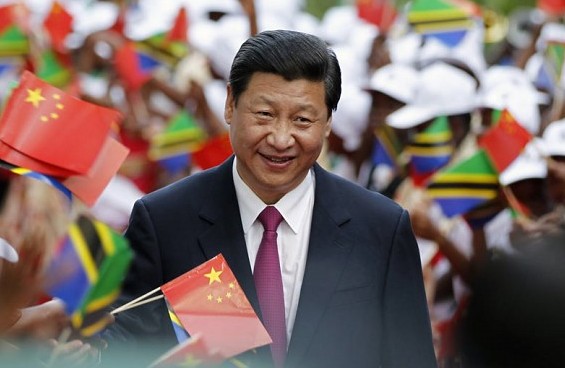China's goodwill diplomacy sets course for the future
- By Shen Dingli
 0 Comment(s)
0 Comment(s) Print
Print E-mail China.org.cn, January 5, 2014
E-mail China.org.cn, January 5, 2014
In his first year as head of state, President Xi visited 12 developing countries, covering six countries in Africa and Latin America, and another six countries in Central and Southeast Asia. Clearly the president attaches great importance to China's neighborhood, proposing a new westward Eurasian Silk Road Economic Belt, and a maritime Silk Road through Southeast Asia, with improved communications through each area seen as a key factor to promote wider regional integration. Evidently, China is transforming itself into a new provider of international public goods in terms of regional initiatives, as well as of finance and technology, all of which has been well received in various parts of the world.
|
|
|
President Xi Jinping walks through Tanzanian women waving flags as he is welcomed at the State House in Dar es Salaam. [File photo] |
Given China's rise, the traditional America-dominated balance of power in East Asia is shifting. Other powers and China's neighbors have felt this, and it is crucial that each side acts sensibly to allow space for peaceful coexistence. At the beginning of autumn 2013, China accelerated its own efforts to develop a balanced peripheral diplomacy. In October, Beijing convened a highly important conference on peripheral diplomacy work, proposing the development of "intimate, sincere, benefiting and tolerant" relationships with China's neighbors. In such a spirit, China, in October, worked out an unprecedented oil co-development agreement with Vietnam, covering waters outside the mouth of the Gulf of Beibu. In the same month, China and India signed a Border Defense Cooperation Agreement, helping to reduce mutual security concerns in the area. China has even started consultations with ASEAN countries on a South China Sea Code of Conduct, ushering in an age of incremental and multilateral progress towards establishing a regional peaceful order with its maritime neighbors.
China's proactive and friendly handling of foreign affairs, especially in its neighborhood, has not gone without reciprocity. One of the watchwords of the Peripheral Diplomacy Work Conference - benefiting - actually means mutual benefit. But for a few of its neighbors' disrespectful behavior, such as the encroachment on the Diaoyu Islands, China does not have unlimited tolerance. China can neither accept Japan's placing the Diaoyu Islands under its ADIZ in 1969, which was a change of status at the time, nor Japan's "nationalization" of the main islands in 2012, a recent change of the status quo. Placing China's sovereign territory of the Diaoyu Islands under China's own ADIZ was, therefore, a measured and restrained response. This is the meaning of China's balanced foreign policy under the present administration. China will not expand its territory but must, and will, protect its sovereignty in the face of Japan's provocations. China is also willing to work with Japan to prevent and control the risks arising from the present circumstances.
From a broader perspective, China, under its new leadership, is defining itself as a more amicable and respectful major power. It is also keen to send the message that respect is not a one-way street and has to be practiced by all parties concerned. China integrated itself further into the world in 2013 and is heading to the future with sensitivity and confidence.
The author is a columnist with China.org.cn. For more information please visit: http://m.formacion-profesional-a-distancia.com/opinion/shendingli.htm
Opinion articles reflect the views of their authors, not necessarily those of China.org.cn.






